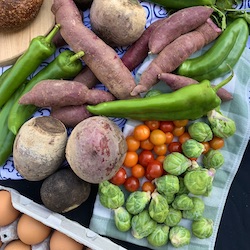Getting Started with Nutrition during Pregnancy
February 2, 2023
Optimal nutrition is crucial during pregnancy, but it’s not easy to know where to even get started. Let’s review the basics!
When we talk about optimal nutrition during pregnancy, we are really referring to the health outcomes we are aiming to achieve. Maintaining peak nutrition status during pregnancy is associated with lower incidence of infant death and preterm birth, healthy infant birth weight, fewer cases of neural tube defects and fetal alcohol syndrome, and improved maternal health. What it comes down to is – in the womb and out of the womb, we are most concerned with growth and development of the fetus and baby.
With that being said, we measure optimal nutrition during pregnancy mostly through the amount, and pace, of weight gain during pregnancy. But weight gain is not accomplished with a snap of the fingers, it is meant to happen over a course of time, at a certain rate, and in the correct proportion. This is a tricky balance and requires careful choices and considerations when it comes to diet and exercise.
So what nutrition considerations should we focus on during pregnancy?
- Macronutrient intake. Not much is different during pregnancy, other than a need to be absolutely sure you are meeting your needs. Carbohydrate intake should be 50-65% of daily calorie needs, with an emphasis on high fiber foods. Protein needs increase to an additional 25 grams per day. And fat intake shifts focus on Omega-3s, DHA and EPA, fat sources such as oily fish, eggs, nuts and seeds like flax, and plant oils like olive.
- Water intake. Water needs increase during pregnancy. It is recommended to drink somewhere between 9 and 12 cups (8 fl-oz) of water per day. Try carrying a water bottle with you, or putting reminders in your phone. Another helpful way to remember to drink water is by having 1-2 glasses after your meals and snacks.
- Micronutrient intake. Won’t go too deep into this right now (more posts on this to come!) but micronutrients support the most important processes in the body and when we aren’t getting enough of one, it can do some damage. When pregnant this is double, for mom and baby. Concentrate on sources of folate, iron, vitamin A, vitamin D, calcium, zinc, iodine, sodium, and all the antioxidants.
- Food safety. The dos and don’ts of pregnancy are stressful. How often are you asking yourself – is it ok to have this? Some of the noteworthy food safety rules include eliminating raw fish and meat, eliminating unpasteurized cheese and milk, washing fruits and vegetables well before eating, and avoiding fish high in mercury like shark, swordfish, and tilefish. These are only just some of the rules to avoid foodborne illness or passing toxins to the fetus.
- Alcohol. It’s important to quickly emphasize that alcohol is known to pass from mother to fetus through the placenta, and have a serious impact on growth and mental development of the child. Fetal alcohol syndrome is a result of frequent consumption of alcohol throughout pregnancy. There is no defined safe level for intake, and therefore it is highly recommended that during pregnancy women abstain from drinking alcohol.
Phew! That was a long list. And it’s only the summaries! Expect in-depth posts to come 🙂
With all this to manage just in terms of nutrition, it’s a lot for someone during pregnancy and there is no need to have to navigate this alone. Dietitians are trained professionals who can act as a support for moms-to-be during this time and beyond.
To learn more about what Dining With Nature offers – take a look at our Services page.
